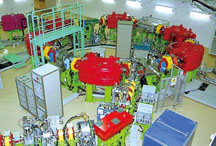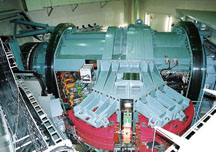TSUKUBA FUTURE
#002 Pioneers in Research on Proton Therapy
Professor SAKURAI Hideyuki, Professor Koji Tsuboi, Professor Takeji Sakae, Faculty of Medicine

Proton therapy (note 1) requires huge facilities such as accelerators and expert human resources. The University of Tsukuba is the only university in Japan capable of proton therapy.
Ordinary radiation has the property of passing through the human body, but proton beams can be stopped inside the body, and thus just only thetumor sites can be irradiated matching the tumor's shape. This therapy is highly effective against cancer, and has fewer side effects than conventional X-ray therapy. In previous clinical research, results approaching the efficacy of surgery were obtained for liver cancer, prostate cancer, early lung cancer, and other types. At present, we are conducting clinical trials on patients with conditions difficult to treat with other therapy approaches, such as large cerebral arteriovenous malformations, malignant melanoma of the head and neck, and liver cancer accompanying portal embolism. In addition, we are providing combined modality therapy, using proton therapy with immune therapy and drugs, for illnesses difficult to cure with local therapy alone. For example, we are conducting clinical trials of proton therapy combined with new immunoadjuvants (note 2) for recurrent liver cancer, and with chemotherapy for advanced lung cancer.
What supports therapeutic results in the clinical setting is basic research in radiobiology and medical physics. In the field of radiobiology, we are conducting research to quantify the damage to human cellular DNA due to proton beams and make mathematical models about the relationship with proton beam energy; research on radiation resistance of brain tumor cells and the characteristics of tumor stem cells; and research to elucidate the biological effectiveness of proton beams in the low-oxygen state. We are also conducting basic research using mouse tumor models to develop therapy techniques combining local proton irradiation with specific immunotherapy.


In the field of medical physics, we are conducting research on radiation technology that can be used in a clinical setting. We are developing new intensity-modulated irradiation methods as technology for concentrating the proton beam on cancer tissues, and examining repeatability and safety during therapy. As a method which can adapt to the movement of organs (lungs, liver etc.), the breathing synchronized irradiation method developed at the University of Tsukuba is having a major impact on particle beam therapy throughout the world. Not only the person's body but the tumor itself undergoes changes in size and shape during therapy. We are conducting research to achieve the optimal irradiation location and therapy conditions to suit the day-to-day status of each patient, by processing in-body information as 4-dimensional image data, and combining that data with a technique for high-speed calculation of the dose distribution. As a particle beam therapy expected to be a next-generation technology, we are conducting research, including development of accelerator neutron sources, for achieving practical use of neutron capture therapy. At present, the proton therapy of the University of Tsukuba is recognized as state-of-the-art healthcare, and has reached the point where it can be offered to a large number of people as a safe, effective therapy. While accepting a wide range of patients from both inside and outside Japan, we are striving to always provide the optimal therapy, and thereby engage in medical practice and research which gives hope to many people.
(Note 1) The proton is the nucleus of the hydrogen atom, and a positively charged elementary particle. Proton therapy is a new type of radiation therapy using a proton beam, in which protons have been accelerated to a high energy. (From the website of the Proton Medical Research Center, University of Tsukuba)
(Note 2) "Adjuvant" is the generic term for substances which enhance the action of drugs.
PREVIOUS
#001 Botryococcus


